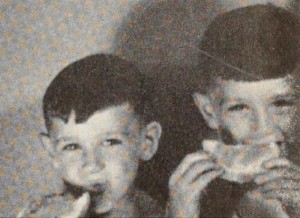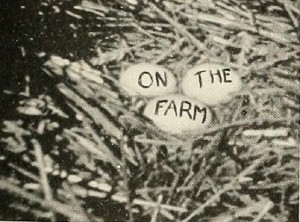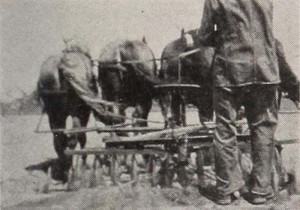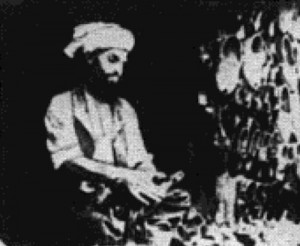
"Going back to The Lord's Prayer for the title of his picture, A. T. Bartlett has produced a handsome, heart-warming and technically able documentary on the theme "Our Daily Bread." In it one follows the staff of life from the vast and golden wheat fields of Australia, through the harvesting and milling of the grain, into the baker's hands and onto my lady's table. Give Us This Day is intelligently planned, smoothly developed and suavely executed. A simple but satisfying narrative continually relates the subject — as it should be — directly to human needs, and a pleasant musical score rounds out the presentation. Especially to be commended is the minimum of footage used by Mr. Bartlett in reporting on this age-old activity of mankind." Movie Makers, Dec. 1952, 339.

"Sunlight and morning noises, the rich, sweet smell of clover, the hot grain fields at midday and windmills drawing water from the deep earth — these are part of the common life of an Ohio farm that two young girls, Marjean and Mary Elizabeth Headapohl, have put into their film, On the Farm. It is a record as American in feeling as Walderts Pond, even though unconsciously so. Innumerable closeups show the generousness of the earth in Ohio, whether in flowers around the house or in the grain and vegetables of the fields. Day after day, the imponderable clouds drift by. Peas are shelled for dinner; the cows are brought in from the pasture by the collie dog; the farm hands return to the barn after a day of harvesting wheat. There is little more shown, in substance, and presently the film ends. But it leaves one with a conviction that this simple way of life in America cannot easily be changed, and that, as long as people of good hearts make records such as this, we cannot wholly forget that the Republic was founded on the plough." Movie Maker, Dec. 1940, 603-604.
"This story of a loaf of bread begins with the plowing of the ground. It continues thru discing and harrowing. Then come fields of waving wheat; the harvest and the threshing; the journey to the grain elevator and the flour mills. Scenes in a modern bakery follow and from there the bread is sent to the retail store. Children eating bread and jam are representative of the 'ultimate consumer'." Educational Film Catalog, 1937 edition, 80.

"Good organization of material and excellent photographic presentation of a familiar story make The Staff of Life, by Jack L. Krapp, an attractive and interesting film. Mr. Krapp has an eye for beauty in everyday subjects, and his progressive story of raising, harvesting and milling wheat leaves no detail uncovered in its searching, yet interesting story. Baking procedures are equally thoroughly covered, all in competent cinematography. For those who feel handicapped when working in 8mm., this film would be an inspiration, for certainly one is conscious of no limitation. A noteworthy feature is the clean cut handling of the titles." Movie Makers, Dec. 1939, 636.

"The Stones of Eden is a documentary on the modern day life of a common wheat farmer in Afghanistan. Today he ekes out his living about the same as he did 2000 years ago. We see him fasten the yoke to his oxen and till the hard dry soil with a primitive plow. Five times a day he stops to kneel in prayer, no matter where he is. We see the grinding of wheat and the baking of bread. At the village the farmer exchanges his wheat for a few necessities, then leaves the village, his only contact with the 20th Century, for his fortified walls of stone to keep out wild animals, human enemies, and other fears. The film won the MPD Student Film Award" PSA Journal, Sept. 1965, 50.